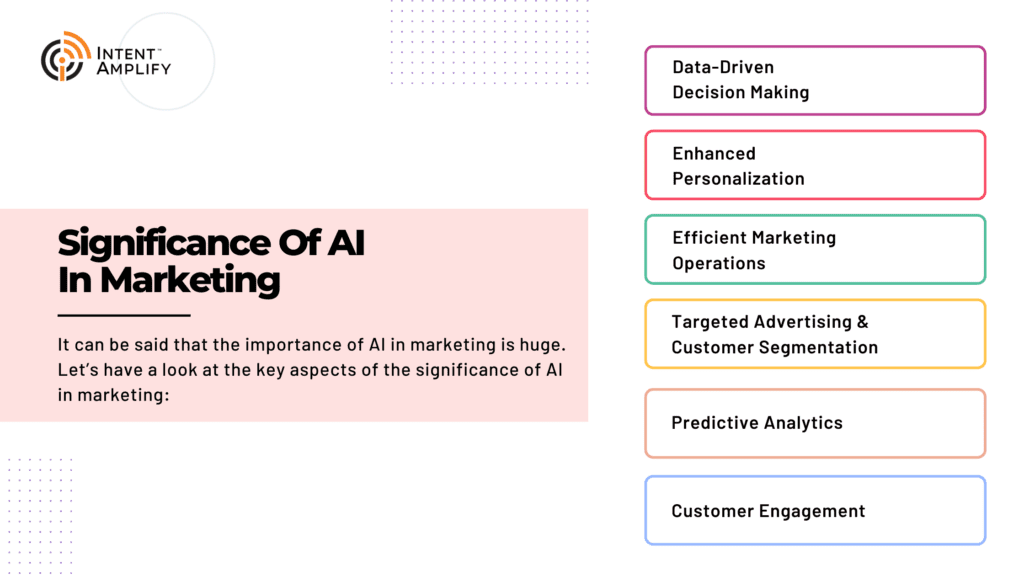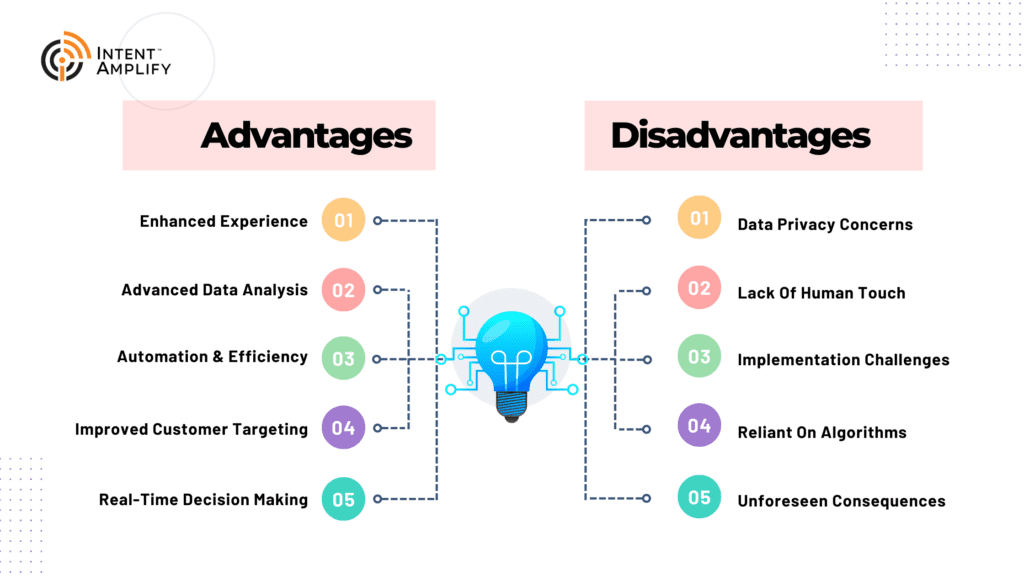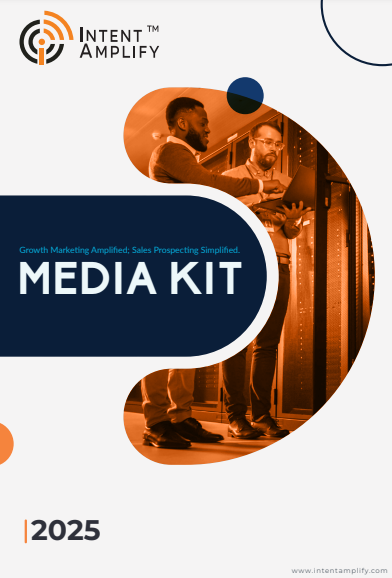
Unleash The Marketing Revolution With The Rise Of AI
- Last updated on: June 19, 2023
Introduction:
The emergence of Artificial Intelligence has brought about a significant transformation in various industries, including marketing, in today’s rapidly evolving digital landscape. Artificial Intelligence has revolutionized the marketing industry by providing marketers with the ability to analyze large volumes of data, automate various processes, and deliver personalized customer experiences. This has made AI a game-changer for marketers across the globe.
This article delves into the significance of AI in marketing, examining both its advantages and disadvantages, and the profound impact it has on businesses.
Significance Of AI In Marketing

The impact of AI on marketing is immense, as it has transformed the manner in which companies engage with their desired consumer base and achieve expansion. It can be said that the importance of AI in marketing is huge.
Let’s have a look at the key aspects of the significance of AI in marketing:
1) Data-Driven Decision Making:
Artificial intelligence (AI) has revolutionized the way marketers leverage data. With AI, marketers can tap into the full potential of data like never before. Utilizing cutting-edge algorithms and state-of-the-art machine learning capabilities, artificial intelligence has the ability to swiftly and accurately analyze extensive quantities of customer data in real-time.
By utilizing this approach, marketers can acquire significant knowledge about customer behavior, preferences, and trends. This, in turn, enables them to make more informed and data-driven decisions.
2) Enhanced Personalization:
In today’s marketing landscape, the incorporation of personalization has emerged as a vital component for achieving success. Artificial intelligence has revolutionized the way marketers operate by enabling them to provide personalized experiences on a large scale.
With the help of AI-powered analytics and automation, companies can generate personalized content, product suggestions, and marketing communications that effectively connect with each customer. This approach leads to increased engagement and higher levels of customer satisfaction.
3) Efficient Marketing Operations:
Artificial Intelligence has the ability to automate tasks that are repetitive and time-consuming, thereby allowing marketers to concentrate on more strategic activities. Artificial intelligence has revolutionized marketing operations by enhancing efficiency through automated email campaigns and chatbots that handle customer inquiries.
By implementing this approach, you can optimize your time and resources, resulting in increased productivity and better utilization of your workforce skills.
4) Targeted Advertising & Customer Segmentation:
By leveraging AI-powered algorithms, it is possible to conduct an in-depth analysis of customer data and segment audiences based on a range of attributes including demographics, behavior, and preferences.
With the use of this feature, you can craft advertising campaigns that are precisely tailored to your target audience, guaranteeing that their messaging is delivered to the appropriate individuals at the optimal moment. Optimizing ad targeting is a crucial strategy for businesses looking to boost their conversion rates and maximize the return on their marketing investments.
5) Predictive Analytics:
With the advent of AI, marketers are now able to leverage predictive capabilities to anticipate the needs and behavior of their customers. Through the analysis of historical data and patterns, AI algorithms have the capability to produce precise predictions pertaining to customer preferences, purchasing behavior, and the likelihood of churn.
With this capability, you can take a proactive approach to customizing your marketing tactics and promotions, resulting in enhanced customer retention and increased revenue growth.
6) Customer Engagement:
The implementation of AI-powered chatbots and virtual assistants has enabled businesses to offer prompt and customized customer support. AI-powered systems have the ability to efficiently manage customer inquiries, offer personalized product recommendations, and assist in making purchasing decisions, all in real-time.
Enhancing your customer satisfaction is crucial for fostering long-term customer loyalty and improving your overall brand experience.
Advantages Of AI In Marketing
AI in Marketing is a game-changer for businesses, providing them with a multitude of advantages that can significantly impact their success. Incorporating AI into marketing strategies can offer several significant advantages like:
1) Enhanced Experience:
Thanks to AI, marketers can now provide customers with tailored experiences that cater to their individual preferences. Through the analysis of extensive data, AI algorithms have the capability to segment audiences and generate personalized content, product suggestions, and promotional communications.
By incorporating a high degree of personalization in your approach, you can establish deeper and more meaningful relationships with your customers. This, in turn, can lead to greater levels of engagement and ultimately result in higher conversion rates.
2) Advanced Data Analysis:
AI has the remarkable capability to swiftly and precisely analyze intricate sets of data. Through the utilization of machine learning algorithms, marketers have the ability to discover significant insights and patterns in customer behavior, preferences, and market trends.
By adopting a data-driven approach, you are equipped with the necessary insights to make informed decisions, fine-tune campaigns, and achieve superior outcomes.
3) Automation & Efficiency
AI can automate mundane and repetitive tasks. This allows marketers to focus on more important activities. They can dedicate time to strategic planning, creative thinking, and making high-level decisions. In today’s digital age, businesses are increasingly relying on automated processes to streamline their marketing operations and enhance productivity. These processes include email marketing, content creation, and social media scheduling, among others.
By automating these tasks, companies can optimize their marketing efforts and achieve greater efficiency in their operations.
4) Improved Customer Targeting:
Businesses can use AI-powered algorithms to analyze customer data. This helps segment audiences based on attributes like demographics, behavior, and interests. Marketers can then create tailored advertising campaigns. This ensures messages reach the right audience at the most effective time.
Targeting your audience with precision can significantly enhance the effectiveness of your marketing endeavors and optimize your ROI.
5) Real-Time Decision Making:
AI technology offers marketers real-time insights and analytics. This empowers them to make informed decisions based on current data. AI-powered dashboards and predictive analytics help marketers monitor campaign performance closely. They can detect patterns and adjust their strategies immediately.
This provides you the ability to swiftly adapt to changes in a fast-paced market which is crucial for businesses to remain responsive and agile.
Disadvantages Of AI In Marketing
Although AI has many advantages for marketing, it is vital to take into account any potential drawbacks and difficulties businesses may face. Below are some of the main drawbacks of using AI in marketing:
1) Data Privacy Concerns:
AI mainly relies on gathering and processing enormous amounts of user data. This is where data security and privacy becomes the concern.. Marketers are responsible for ensuring that customer data is gathered and used lawfully, in accordance with all applicable laws, and after getting all essential consents. Customer trust can be harmed by improper data processing, which can also have negative legal and reputational repercussions.
2) Lack Of Human Touch:
AI is inherently incapable of having the personal connection and emotional intelligence that human marketers do. Although AI algorithms can streamline procedures and customize user experiences, they might find it difficult to truly mimic the empathy and complex understanding that only human interactions can offer. For complex questions or delicate topics, buyers may still prefer speaking with human agents in certain marketing settings.
3) Implementation Challenges:
It can be difficult to integrate AI into current marketing infrastructure and procedures. It necessitates significant expenditures on technology, knowledge, and training. During the installation phase, businesses must take into account elements like compatibility with current systems, scalability, and potential disruption. Additionally, it is essential to guarantee that staff members have the knowledge and abilities needed to administer AI systems.
4) Reliant On Algorithms:
Algorithms and machine learning models play a significant role in AI-driven marketing. Although these algorithms are intended to maximize marketing efforts, they may yield incorrect results. In order to verify that AI algorithms are compliant with ethical principles and resolve any biases or mistakes that may occur, organizations must regularly monitor and evaluate the performance of these algorithms.
5) Unforeseen Consequences:
AI systems have the potential to be complex and unpredictable, with unexpected results. AI algorithms with errors can make inaccurate suggestions. They might interpret data incorrectly. Sometimes, they produce unexpected results. This happens because they rely on pre-existing data. Marketers need to review AI technologies regularly. It’s crucial to have mechanisms to identify and fix issues quickly.

Wrapping Up!
A new era of commercial opportunities has begun as a result of the rise of AI in marketing. It’s crucial to remember that while AI has many advantages, there are also problems that need to be carefully solved. Businesses must stay current on the latest advances. They should adopt a responsible and ethical approach to AI deployment. AI is expanding and influencing the marketing sector. By understanding AI’s potential, businesses can seize new opportunities. They can provide personalized experiences. This helps them succeed in today’s dynamic, data-driven marketing environment.




